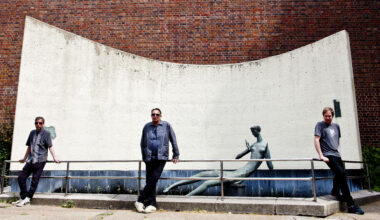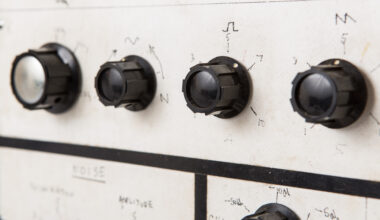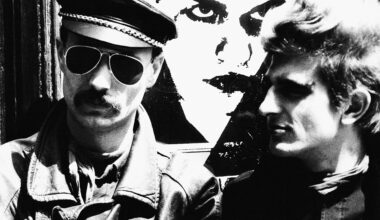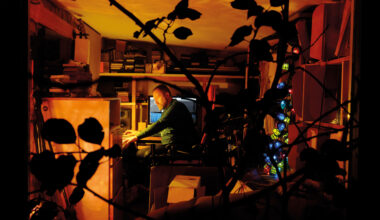Andrew Smith details the musical backdrop to his best-selling book ‘Moondust’, a fascinating journey to find and interview the surviving moonwalkers, and explains how the Apollo missions and the counter-culture of the 1960s were flip sides of the same coin
Between the summer of 1969 and Christmas 1972, 12 men gazed back at the Earth from the surface of the Moon. They were the luckiest of a lucky group of 24 American astronauts who made the quarter-million mile journey out there (the other dozen orbited, often in spooky isolation, but didn’t land), and were then cast aside as the space programme of the 1960s ground to a mortified halt. These two dozen men remain the only human beings to have left Earth orbit, sons of the 60s in excelsis. To this day, no one’s been so far out as they.
When I set out to track down the nine surviving members of this eccentric cadre for my 2005 book ‘Moondust’, I began with a number of questions, the most fundamental of which was why did I give a damn about these people? I’d grown up in California, before moving to the UK with my English parents in 1974, and I’d watched Neil Armstrong and Buzz Aldrin’s landing in July 1969 from my home near San Francisco. I remember the day well. The astronauts’ feat seemed amazing to me, but thereafter, like most people, I forgot about them. The truth was that all that money and effort had seemed to lead nowhere, least of all to the space-faring future that had once seemed our destiny.
The things I thought I’d kept from that era were a passion for music and a suspicion of suits and ties. And yet, the thought of the moonwalkers’ disappearance unsettled me for reasons I couldn’t put my finger on.
Eventually I realised there was a link between the freaky race to space and the music that swirled around me through my childhood and youth, the product of a counter-culture which, after promising to deliver so much, had imploded at about the same time as the space programme. The surprising thing was that when I began to research the period, I found this link was not simply a product of my imagination; that both had been emanations of an economic golden age, when Americans had money to spend and young people felt secure enough to question their inheritance and experiment with alternatives. Vietnam, the space programme, the music scenes of London, Liverpool, Los Angeles, New York – none of them could have happened in quite the way they did at any other time. One of the most telling revelations was this: when Apollo 11 touched down, about a month before Jimi Hendrix skewered the US national anthem at Woodstock, the average age of NASA’s elite Control Room staff in Houston was 26.
“They’d never experienced failure,” said Flight Director Gene Kranz, himself only 35. “So they had no fear.”
What this means is that the moonshots and the counter-culture were flip sides of the same coin. They were how Americans chose to spend an inheritance of wealth and hope that they may yet prove unique. Once I understood this, I stopped being surprised at the way music entered the ‘Moondust’ story at every turn, or at the sometimes bizarre ways in which it followed me in my search to find the remaining moonwalkers.

Occasionally the connections were explicit. Frank Zappa’s father worked on missile systems at Edwards Air Force base in the Mojave desert of California while Neil Armstrong was testing rocket planes there, and Rufus and Martha Wainwright’s grandfather, Loudon II, was a reporter assigned to the first wave of astronauts by Life magazine. One of the astronaut wives, Rene Carpenter, laughed as she said, “Oh, he was a doll-baby, so sensitive… always crying”, adding that “[he] was the one thing I trusted, because you couldn’t trust NASA”. At least twice during my travels I was asked to get word to David Bowie that there was a real-life spaceflight waiting for him if he wanted it.
There were lots of small musical interventions too. After watching the moonwalker-turned-artist Alan Bean give a moving talk in Houston, I turned the car ignition to find Bowie’s ’Space Oddity’ on the radio, knowing that no one would ever believe me. Later, I read about Cambridge scientists discovering the lowest note ever detected, a B-flat emanating from a black hole, 57 octaves below the one in the middle of a piano, siren song of the universe. When I found one of my favourite bands, Sleater-Kinney, playing in the courtyard of my hotel in Tucson, their singer Corin Tucker told me excitedly that she’d spotted Robert Plant of Led Zeppelin the day before in Austin, and had got his autograph: who knew that before long I would be seated before Plant myself, listening to him explain that he never believed they really went to the Moon in the first place? Seems Zeppelin wore Apollo spacesuits on their ‘Early Days’ and ‘Latter Days’ greatest hits CDs just because they liked the look.
All the same, Plant unlocked part of the story for me when he explained his generation’s love for American blues and R&B by saying:
“When I heard Chuck Berry singing, relating to a youth culture which sounded so gregarious and switched on, it was like a calling, like someone blowing a horn on the top of a mountain… The thing about our generation was that there was no conveyor belt that brought this stuff to us – and I think for that reason, when you found what you liked, it wasn’t a casual affair, it was intense…”
Listen to a tune like Howlin’ Wolf’s ‘Smokestack Lightnin’, released a year before the Soviet satellite Sputnik inaugurated the Space Age in 1957, and you instantly know what he means.
Hence the bands of the British beat boom, who supplied a good deal of the soundtrack to the space age, and in turn influenced much of the sun-drenched, acid-kissed music associated with the Haight in San Francisco: The Grateful Dead, Jefferson Airplane, Strawberry Alarm Clock, Moby Grape and Creedence Clearwater Revival (whose ‘Bad Moon Rising’ climbed to Number One in the UK charts a couple of months after the Apollo 11 mission). Like many people whose tastes were remade by punk, I’d written off or forgotten a lot of this stuff, but was now astonished by how vibrant it still sounded and how powerfully these records evoked their era. By the time I arrived in LA to meet Buzz Aldrin on the first anniversary of the 9/11 outrage, it felt like 1966 again – the year in which Moby Grape and the Alarm Clock formed, and in which Aldrin made his first spaceflight aboard Gemini 12.
Throughout, one of the things to strike me was how similar space talk sounds to drug talk. Back in ’66, you could get arrested in some states for the Owsley-esque claim that “The stars are my home”, as one Apollo astronaut did, and it worked the other way round too. The Byrds’ ‘Eight Miles High’ was banned as a “drug song” upon its release that year, when in truth band members David Crosby and Jim (later Roger) McGuinn were space and flying enthusiasts who spent hours lying on the bonnets of their cars watching airliners come and go at LAX. Like Paul Kantner of Jefferson Airplane, they were rapt at the possibility of finding life on or beyond the Moon (as ‘Mr Spaceman’ from the same classic Byrds album, ‘Fifth Dimension’, attests). So the song really was about flying, specifically to London for the first time.
I wasn’t the only one for whom these two 60s projects were connected, either. Wayne Coyne of The Flaming Lips recalled the Apollo 11 landing both for the drama of the descent and his brother’s interestingly-timed confession to their mother that he’d been experimenting with acid. Wayne then riffed on a line from my favourite Lips tune, ‘Do You Realize??’, which simply asks “Do you realise / We are floating in space?”. At my suggestion that it was soothing, he sputtered:
“No! I don’t mean that line to relax you! We really are. We’re on some fucking insignificant speck in an endless cold vast sea of nothing. I mean, it’s just hanging… I don’t even know why it works. It wouldn’t surprise me that much if I woke up one morning and someone said to me, ‘Hey, you know how the world was turning? Well, it’s stopped’. Why wouldn’t it? I have dreams sometimes about shit like that, but it could be real. That part of space, I love that, the way it’s full of mysteries. It seems to encapsulate the way that the more you understand, the less meaning things have.”
Music was with the moonmen too. Apollo 12 commander Pete Conrad had missed music on his first spaceflight, aboard Gemini 11, so he took a portable cassette player with him to the Moon, and he and his crew bounced around to Joao Gilberto’s hit ‘The Girl From Ipanema’ and ‘Sugar Sugar’ by The Archies. He also took a tape of country and western songs, which his co-pilot Alan Bean just about managed to tolerate. When Brian Eno came to provide the music for the Oscar-nominated documentary ‘For All Mankind’, he was intrigued to find that many of Conrad’s fellow moonwalkers had taken country music with them on their journeys as well.
“I thought that said something interesting about how they saw themselves,” he twinkled, “which was as frontiersmen.”
Most of Eno’s score is collected on his ‘Apollo’ album, and more than any other piece, ‘An Ending (Ascent)’ captures the sense of wonder I continue to feel when I think of the dreamy two years spent writing ‘Moondust’. Composed to accompany the emotive reuniting of the Lunar and Command modules, it also reflects the tone in Eno’s voice when he recalled the night of the first Moon landing, saying:
“It was a full moon that night and we looked out the window and saw it and thought, ‘My God, this is really happening’. It was a magical moment. It just seemed incredible at the time.”
Classical music featured on the lunar trips too. Bizarrely, several astronauts took the soundtrack from Stanley Kubrick’s newly-released ‘2001: A Space Odyssey’, exposing the weird dynamic between sci-fi and real-sci that drove the Apollo programme from the very beginning. György Ligeti’s ‘Lux Aeterna’ will shiver the spine of anyone who’s seen that film. By the time I’d finished my research, I could barely stand to hear Richard Strauss’ ‘Also Sprach Zarathustra’ – the theme from ‘2001’, which has become a kind of shorthand for space – but ‘Lux Aeterna’ is another thing entirely. Space is wondrous, but it’s scary as well: one false move and it’ll turn you inside out.

More intriguing still was Neil Armstrong’s choice of Antonín Dvořák’s ‘New World Symphony’ and something his crewmate Michael Collins referred to as “strange, electronic-sounding music”. Armstrong identified the latter to me by email as the theremin work of Dr Samuel Hoffman, specifically a 1947 album called ‘Music Out Of The Moon’, which the First Man taped from his own collection. The theremin had produced the unearthly quaver on the Beach Boys’ ‘Good Vibrations’ in 1966, but the sound was (and still is) most often associated with sci-fi B-movies from the 1950s, notably Fred M Wilcox’s ‘Forbidden Planet’ and Robert Wise’s magnificent ‘The Day The Earth Stood Still’, making its selection by Armstrong quirky to say the least.
Truth be told, it was always the quirks and contradictions that most fascinated me about Apollo. The whole enterprise had been set in train by John F Kennedy in 1961, after a disastrous start to his presidency called for a show of vision. NASA had neither plans, desire, nor means to go to the Moon at that stage (NASA head Robert Gilruth claimed to have woken up screaming the night after JFK’s announcement), but with the US lagging behind the Soviet Union in science, technology and space, the president instructed his advisors to find a contest that America could win. Had ballroom dancing been suggested, who’s to say he wouldn’t have gone for it? Viewed this way, the Moon conquest was the most immaculate folly ever contrived, born of vanity and opportunism as much as rapture.
As such, it was also a perfect expression of its time. It’s easy to forget that the call to peace and love was a response to violence, brutality and unrest on a grand scale. The Last Poets, often said to be the first rap group, caught the prevailing sense of disequilibrium in the raging percussive groove of their masterpiece ‘Mean Machine’, but their counter-culture contemporary Gil Scott-Heron was explicit in connecting social forment to the space race in ‘Whitey On The Moon’ from his classic ‘The Revolution Will Not Be Televised’ album. Both sound as modernistic and mind-blowing today as when they first appeared. Soberingly, they also sound as relevant – a trait shared with Jimi Hendrix’s freeform excoriation of ‘The Star-Spangled Banner’ at Woodstock. The guitarist cleverly denied any political intent behind the piece, but his Stratocaster told another story, of people screaming and bombs falling and bullets tearing flesh. He knew of whence his instrument spoke too, because like most black men of his generation, Hendrix had done time in the army. Had a training injury not bought an honourable discharge, he might well have ended up in Vietnam himself.
Just as rock ’n’ roll rose with the space age, it seems no coincidence to me that the 60s disintegrated in spirit at about the same time as the lunar programme, at the end of 1972, as the last two astronauts stepped off the Moon. Even as a political naif, you could hear the change on the radio, in the sardonic strains of Steely Dan – named after a dildo in a William Burroughs novel – and the rise of hedonistic glam rock. David Bowie described how he felt at the time thus:
“For me and several of my friends, the 70s were the start of the 21st century. It was Kubrick’s doing, on the whole, with ‘2001’ and ‘A Clockwork Orange’… There was a distinct feeling that nothing was true anymore and that the future was not as clear-cut as it seemed… Everything was up for grabs.”
So Ziggy Stardust was the parody of a rock star by a would-be rock star, herald of an age where everything would start to look like parody and satire suddenly seemed pointless – a brilliant conceit. And when rock tried to be good, it ended up looking flabby and self-important, as when well-meaning George Harrison staged the Concert For Bangladesh at Madison Square Garden in New York. The former Beatle coaxed Bob Dylan out of sulky retirement and booked a smack-addled Eric Clapton onto every flight out of London for a week before the guitarist then known as “God” managed to catch one, but still ended up presiding over the counter-culture version of Watergate, with all the money blown on expenses and tax.
By then, of course, Jimi Hendrix was dead, as was Janis Joplin and Jim Morrison, while others like Pink Floyd’s Syd Barrett and Peter Green of Fleetwood Mac had fried their minds on acid. Within a few years, punks such as The Stranglers (always the scariest of their kind to me, because they sounded so mean but looked so normal) would be mocking the optimism of their predecessors in songs like ‘No More Heroes’ and ‘Straighten Out’. Listen to the lyrics of almost any song from the punk years and it becomes clear that the counter-culture, like humanity’s brief tilt at the stars, had come to look like a hubristic sham to us all.
Except that nothing about Apollo is so sharply defined. The more I spoke to the moonwalkers, the more clearly I saw that the most moving part of the experience for them had been seeing the Earth from such a distance; as an opalescent sphere drifting through space, the only colour you could see in any direction. Among the 12 moonwalkers, there had been epiphanies, breakdowns, awakenings. Jim Irwin claimed to have heard God whispering to him on the lunar surface; Edgar Mitchell felt plugged into the cosmos like a lightbulb and became a new age guru in Florida. At a cost of roughly $13 per year per American, the Apollo programme was also great theatre, perhaps the only shared global memory that doesn’t involve tragedy.
Of all the descriptions of Apollo, Norman Mailer’s “surreal adventure” still seems the most apt to me. There are times when psychedelic and spiritual ecstasy sound so remarkably like the space travel experience that you start to wonder whether they’re part of the same matrix. Listen to Edgar Mitchell describe his “epiphany”, or to other astronauts trying to explain what they saw and felt, and it’s easy to believe. Plug into the sounds of space, of radio activity over Neptune or Jupiter’s moons as recorded by NASA probes, and it’s even easier.
When I considered Neil Armstrong and Pete Conrad’s eccentric choices of music to soundtrack their trips to the Moon, I fell to wondering what tunes I would select given the chance. I was astonished at how easily an answer came. Quite apart from its theme, AR Kane’s ‘A Love From Outer Space’ is one of the most euphoric songs I know, capturing the mood I’d want to take with me to the stars. The more I thought about it, the more certain I felt that, if anything beats The Archies’ ’Sugar Sugar’ in my book (and not much does), this is it.

An updated edition of Andrew Smith’s ‘Moondust’ is out on Bloomsbury with a new chapter to commemorate the 50th anniversary of the first Moon landing






